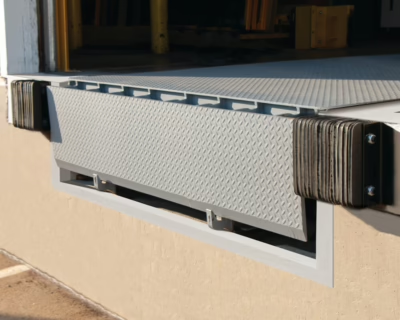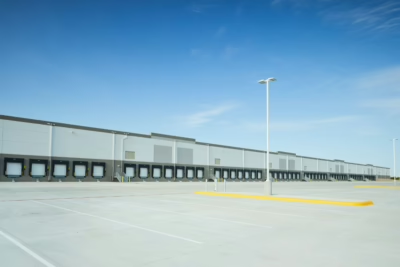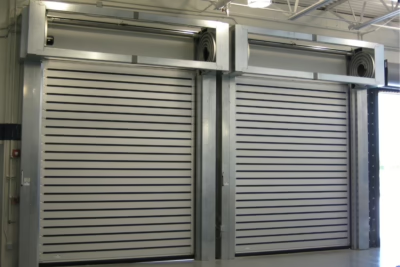Loading dock efficiency hinges on the performance of your dock equipment — and few components are more critical than the dock leveler. While mechanical levelers have long been a mainstay in many facilities, hydraulic dock levelers offer clear advantages in speed, safety, and long-term value.
If your facility still relies on aging mechanical equipment, it may be time to consider a hydraulic upgrade. In this post, we’ll explore the key benefits of hydraulic dock levelers, how they improve loading dock operations, and why now is a smart time to modernize.
Why the Type of Dock Leveler Matters
Dock levelers bridge the gap between a loading dock and a truck bed, ensuring a smooth and safe transfer of goods. The wrong leveler — or a poorly maintained one — can lead to equipment damage, safety hazards, and costly delays.
While mechanical dock levelers require manual activation via pull chains and springs, hydraulic models use powered cylinders for seamless operation. That one change brings a host of operational improvements.
1. Enhanced Safety for Dock Personnel
Safety is one of the most compelling reasons to upgrade. Mechanical levelers require workers to bend, pull, and strain to engage the platform — a repetitive process that increases the risk of back injuries, slips, and falls.
Hydraulic dock levelers are push-button operated, eliminating manual effort altogether. This reduces physical strain and minimizes the risk of accidents, especially in high-volume dock environments.
Built-in safety advantages:
- Smooth, controlled motion eliminates sudden drops or jerks
- Automatic return-to-dock feature resets the leveler after truck departure
- Safety lips and toe guards protect workers and equipment
- Emergency stop features allow instant shutdown if an issue occurs
Facilities that prioritize OSHA compliance and worker well-being will find hydraulic systems far superior to their mechanical counterparts.
2. Faster and More Efficient Operation
Time is money — especially in fast-paced distribution and logistics operations. Hydraulic dock levelers streamline the loading and unloading process by significantly reducing cycle time.
Efficiency benefits include:
- Push-button deployment activates the platform in seconds
- Faster vehicle turnaround leads to increased throughput
- Reduced downtime from mechanical failure or manual error
When paired with other high-performance equipment, like vehicle restraints and overhead doors, hydraulic levelers can help facilities move more product with fewer delays.
3. Lower Maintenance Requirements
One of the biggest hidden costs of mechanical levelers is maintenance. Springs wear out. Cables snap. Pull chains jam. These issues can result in costly service calls and unexpected downtime.
Hydraulic dock levelers are built for durability and simplicity. With fewer moving parts, they require less frequent maintenance and offer better long-term reliability.
Maintenance advantages:
- No springs or cables to replace
- Sealed hydraulic cylinders are low-maintenance and corrosion-resistant
- Less wear and tear from smooth, controlled movement
- Fewer emergency repairs and service calls
Over the course of several years, the reduced maintenance burden can add up to thousands in saved costs — not to mention fewer interruptions to operations.
4. Longer Equipment Lifespan
Because hydraulic levelers experience less mechanical stress than manual systems, they tend to last longer under normal operating conditions.
Facilities that operate multiple shifts or handle heavy trailer traffic will benefit from this added longevity. A longer lifespan means less frequent replacements and a better return on investment.
Most modern hydraulic levelers also include smart features like:
- Cycle counters to track usage and schedule preventive maintenance
- Diagnostics displays to identify issues before they become critical
- Weather seals and protective coatings to extend life in harsh conditions
5. Better Compatibility with Modern Trailers
The trucking industry is evolving — with more variation in trailer heights, bed configurations, and vehicle types than ever before. Mechanical levelers may struggle to accommodate newer trailers, leading to awkward angles or unsafe gaps.
Hydraulic levelers offer more precise positioning and adaptability to a wide range of trailer configurations.
This flexibility is especially important for:
- Facilities working with low-profile trailers or step decks
- Third-party logistics hubs with mixed fleet vehicles
- Warehouses receiving shipments from regional or international carriers
Upgrading ensures your dock equipment can keep up with the demands of modern transportation.
6. Improved Facility Image and Employee Satisfaction
Aging, clunky dock equipment can give off the wrong impression — both to customers and employees. Replacing outdated systems with modern hydraulic levelers reflects a commitment to safety, efficiency, and operational excellence.
Dock workers especially appreciate upgrades that reduce physical strain and increase confidence in the equipment. In turn, this can help with employee morale and retention — an increasingly important factor in warehouse and distribution staffing.
Real-World Example: From Mechanical to Hydraulic
A food distribution center in Houston operated 12 mechanical dock levelers that required constant maintenance and slowed down their loading times. With daily shipments increasing, they opted to upgrade half their bays to hydraulic systems with integrated vehicle restraints.
Within six months, the results were clear:
- Loading times decreased by 18%
- Maintenance costs dropped by 42%
- Employee satisfaction surveys showed improved perception of workplace safety
Based on that success, the facility began phasing in hydraulic upgrades across all remaining bays.
Is It Time for Your Facility to Upgrade?
Not every facility needs hydraulic levelers — but for many, they’re a smart long-term investment. If your operation is experiencing any of the following, it’s worth evaluating your options:
- Frequent maintenance on mechanical dock levelers
- Increased loading volume or vehicle traffic
- Employee safety concerns during dock operations
- Incompatibility with newer trailer types
- Need to improve speed and efficiency
Upgrading may involve upfront costs, but the operational and safety benefits typically deliver a strong return — often within just a few years.
Final Thoughts
Hydraulic dock levelers represent a clear upgrade in terms of performance, safety, and reliability. While mechanical levelers may seem cost-effective in the short term, their long-term drawbacks — from higher maintenance to slower operation — can drag down productivity and increase total cost of ownership.
At DuraServ, we help facility managers modernize their dock operations with the latest in hydraulic equipment. Whether you’re planning a full retrofit or upgrading a few bays at a time, we can help assess your needs and guide you toward the right solution.



